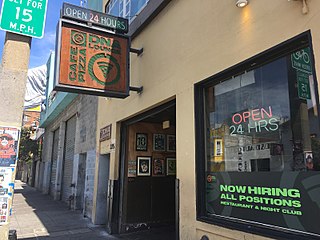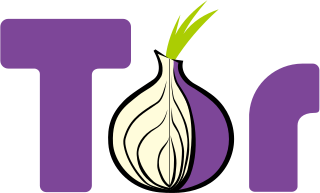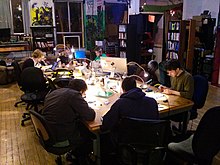
DNA Lounge is an all-ages nightclub and restaurant/cafe in the SoMa district of San Francisco owned by Jamie Zawinski, a former Netscape programmer and open-source software hacker. The club features DJ dancing, live music, burlesque performances, and occasionally conferences, private parties, and film premieres.

A hackathon is an event where people engage in rapid and collaborative engineering over a relatively short period of time such as 24 or 48 hours. They are often run using agile software development practices, such as sprint-like design wherein computer programmers and others involved in software development, including graphic designers, interface designers, product managers, project managers, domain experts, and others collaborate intensively on engineering projects, such as software engineering.

The Metalab is a hackerspace in Vienna's central first district. Founded in 2006, it is a meeting place of the Viennese tech community, hosting events from cultural festivals to user groups. It has played a catalyst role in the global hackerspace movement and was the birthplace of several internet startup companies.

Mitch Altman is a Berlin-based hacker and inventor of TV-B-Gone. He is a featured speaker at hacker conferences, an international expert on the hackerspace movement, and teaches introductory electronics workshops. He is also Chief Scientist and CEO of Cornfield Electronics.

Jacob Appelbaum is an American independent journalist, computer security researcher, artist, and hacker.

A hackerspace is a community-operated, often "not for profit", workspace where people with common interests, such as computers, machining, technology, science, digital art, or electronic art, can meet, socialize, and collaborate. Hackerspaces are comparable to other community-operated spaces with similar aims and mechanisms such as Fab Lab, men's sheds, and commercial "for-profit" companies.
TOG is a hackerspace in Dublin, Ireland. tóg is a word in the Irish language; one of its meanings is 'to build or construct'.

The maker culture is a contemporary subculture representing a technology-based extension of DIY culture that intersects with hardware-oriented parts of hacker culture and revels in the creation of new devices as well as tinkering with existing ones. The maker culture in general supports open-source hardware. Typical interests enjoyed by the maker culture include engineering-oriented pursuits such as electronics, robotics, 3-D printing, and the use of computer numeric control tools, as well as more traditional activities such as metalworking, woodworking, and, mainly, its predecessor, traditional arts and crafts.
shackspace is a Stuttgart hackerspace run by shack e.V., a non-profit association, established in 2009. Originally located in North Stuttgart, it moved to Stuttgart-Wangen in March 2011. It is among the largest and fastest-growing hackerspaces in Germany, with over 110 paying members. The mission of shackspace is to foster an environment where people can collaborate on ideas, share knowledge and talents, and explore aspects of life including science, technology, software development, arts and crafts and anything else members express an interest in. shackspace views itself as not only a physical workspace, but also a community of like-minded people.
Geeks Without Bounds is a humanitarian organization of technologists, first responders, policymakers, and volunteers that work towards improving access to communication and technology. With a focus on working with communities that have limited infrastructure due to violence, negligence, or catastrophe, they organize hackathons for humanitarian technology, and help prototype projects intended to turn into long-term initiatives through their Accelerator for Humanitarian Projects.

HackerspaceSG is a 1,202-square-foot (111.7 m2) technology community center and hackerspace in Singapore. While predominantly an open working space for software projects, HackerspaceSG is also a landmark of the Singapore DIY movement, and also hosts a range of events from technology classes to biology, computer hardware, and manufacturing. The space is open to all types of hackers.

The Tor Project, Inc. is a 501(c)(3) research-education nonprofit organization based in Winchester, New Hampshire. It is founded by computer scientists Roger Dingledine, Nick Mathewson, and five others. The Tor Project is primarily responsible for maintaining software for the Tor anonymity network.

HackerNest is a not-for-profit organization and global movement founded on January 11, 2011. The organization unites local technology communities around the world through community events and socially beneficial hackathons to further its mission of economic development through technological proliferation. It is Canada's largest, most prolific technology community with growing international reach.

Liz Henry is an American blogger, author, translator, technologist, and activist. She is a co-founder of the first women's hackerspace in San Francisco, Double Union, where she is still active. She is also an advocate for disability technology and hacking existing technology for use by disabled people.

Double Union is a San Francisco hacker/maker space. Double Union was founded by women in 2013 with the explicit goal of fostering a creative safe space. The organization’s mission is to be a community workshop where women and nonbinary people can work on projects in a comfortable, welcoming environment.
Mothership HackerMoms is a nonprofit hackerspace/makerspace in Berkeley, California, founded in 2011. It was the first all-women hackerspace.,
The Omni Commons is a group of nine collectives in San Francisco's Bay Area devoted to DIY and community education. It traces its inception to the Occupy movement, specifically Occupy Oakland, and was founded in 2014 on the principles of "community, positive creation and radical inclusion".
The National Security Innovation Network is a United States Department of Defense (DoD) program office under the Defense Innovation Unit that seeks to create new communities of innovators to solve national security problems. NSIN partners with national research universities and the venture community to reinvigorate civil-military technology collaboration. As opposed to making investments in specific technologies, government research and development programs, or startups, NSIN focuses on human capital innovation – i.e., developing and enabling innovators and human-centered networks to solve national security problems. In support of this mission, NSIN provides tools, training, and access to DoD assets that enable entrepreneurs and intrapreneurs to develop and commercialize high potential products in the national interest.
torservers.net is an independent network of non-profit organisations that provide nodes to the Tor anonymity network. The network started in June 2010 and currently transfers up to 7.4GB/s (~59.2Gb/s) of exit node traffic as of May 2022.

Hack Club is a global nonprofit network of high school computer hackers, makers and coders founded in 2014 by Zach Latta. It now includes more than 400 high school clubs and 23,000 students. It has been featured on the TODAY Show, and profiled in the Wall Street Journal and many other publications.















